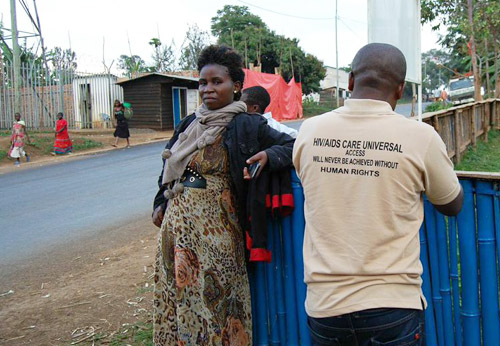Posted by Lucile Scott, December 12, 2014

Aimée Furaha (left), head of AHUSADEC’s sex worker program, and Raphael Ngeleza, director of AHUSADEC.
Eleven years ago, the Democratic Republic of the Congo (DRC) was at the center of a brutal five-year conflict known as “Africa's world war" that resulted in millions of deaths and regional instability. While a peace accord was signed in 2003, fighting and violence persist in the eastern part of the DRC, where several armed militias continue to vie for control of the country’s wealth of minerals, including cobalt, gold, diamonds, and coltan, a metallic ore used in cell phones and laptops.
East-DRC is also home to GMT Initiative grantee partner Action Humanitaire Pour la Santé et le Développement Communautaire (AHUSADEC), which provides HIV testing, counseling, and outreach services to gay men, other men who have sex with men, and transgender (GMT) individuals and to female and GMT sex workers. It is the only group in this part of the country targeting GMT individuals with HIV services.
“East-DRC is a place where there have been many conflicts, rapes, and sexual violence and many public health problems in general, but now, thanks to AHUSADEC, with amfAR’s support, GMT individuals can benefit from HIV interventions for the first time,” says Freud Muciza, who works for the DRC’s national AIDS program and was contracted by amfAR to assist AHUSADEC in further developing its organizational capacity and impact.
While the mines in the East Congo produce substantial profit, the local population receives little of the economic benefits—but bears all the costs of the endemic violence. The widespread rape of women as a tactic of war caused a senior UN official to dub DRC “the rape capital of the world” in 2010, and the violence displaced more than 100,000 people throughout the country in 2013 alone.
Bukavu, the city where AHUSADEC is based, has a large United Nations and police presence, and many refugees, usually from the rural villages near the mines, often come there, further straining the city’s already taxed housing, employment, and health infrastructure. In the midst of all this instability and flux, successfully reaching GMT individuals, a highly marginalized, stigmatized, and often hidden population, is difficult. The severe stigma around homosexuality has also prevented other groups from using their resources, which are often limited, to target them.
And while many of the international humanitarian groups in Bukavu are operated by foreigners in headquarters enclosed by protective walls, AHUSADEC is run entirely by locals out of a white stucco house with a large, welcoming front porch. The building provides a place for GMT individuals, many of whom have been kicked out of their homes or denied jobs because of their sexual orientation, to feel welcome and like they are part of a community. “They trained me as a peer educator and I felt I had a direction and purpose,” says Daniel, 19, a client who has been performing peer outreach services for one year. “I am proud to be part of this important work.”
Data about GMT individuals in the country is limited, but according to the latest UNAIDS progress report, the HIV rate among men who have sex with men (MSM) is 18%. Due to limited services targeting MSM, few are reached with HIV prevention messaging, and the report also estimates that only about 15% use condoms regularly—meaning the rate could easily rise if more men are not accessed with testing and prevention messages, like those provided by AHUSADEC. Even more challenging, almost no data exists on transgender individuals.
AHUSADEC is also working to combat the stigma, discrimination, and violence GMT individuals encounter, both in healthcare settings and in society in general. They have a program to train police to prevent violence against GMT individuals and they also accompany clients who test positive for HIV to the hospital to prevent them from experiencing discrimination. “amfAR has helped us respond to discrimination,” says Bienfait, a nurse who performs HIV tests and counseling at AHUSADEC. “Before GMT individuals would not go to the hospital because of discrimination, and now an AHUSADEC staff member or volunteer helps them navigate the services.”
And because many GMT individuals are not aware of AHUSADEC’s services or are hesitant to seek them out at AHUSADEC’s offices, the staff makes weekly visits to bars frequented by GMT individuals to perform mobile HIV testing. During one recent mobile testing visit, Bienfait and the staff set up in a fence-in dirt yard behind the bar, which, like most establishments in Bukavu, is subject to frequent electrical brownouts. A bartender announced over a loudspeaker that free HIV tests would be offered out back, and soon the bar patrons began to line up, and Bienfait, sitting behind a small plastic table in his white lab coat, began testing them one by one.
You can view photos of AHUSADEC and its mobile testing program below.
...